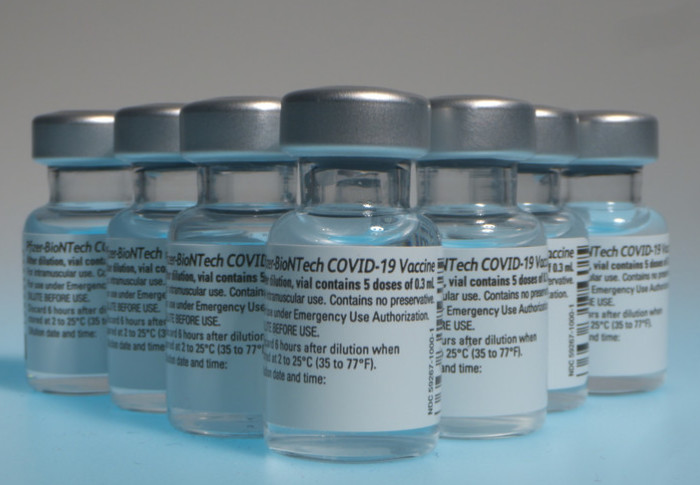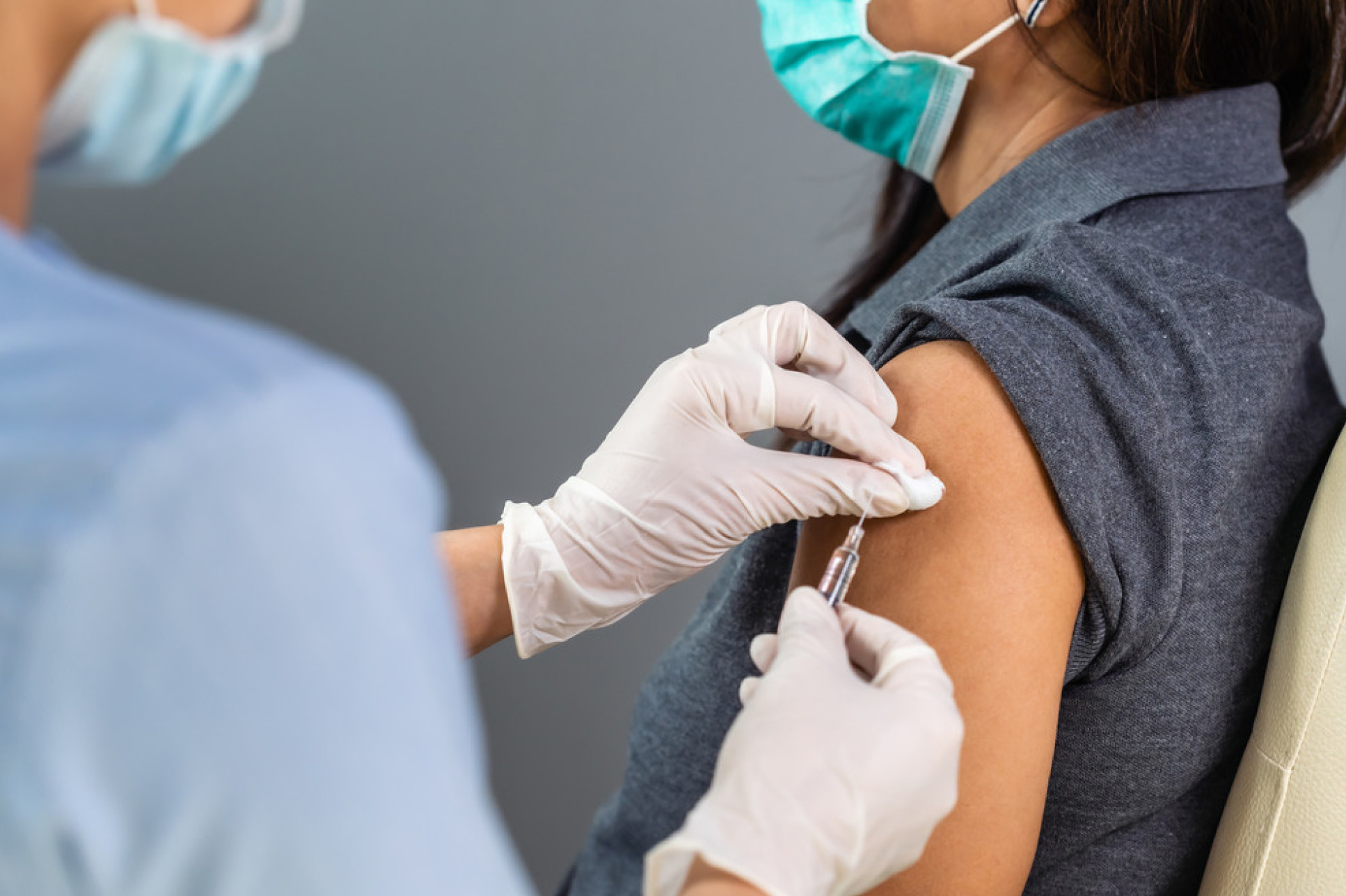Single dose of vaccine acts as ‘booster’ in those with prior COVID-19 infection

Two new studies have revealed insights into the immune protection provided by a single dose of COVID-19 vaccination.
The first study, published today in a research letter in The Lancet, found people who have previously had COVID-19 have an enhanced antibody response with a single dose of RNA vaccine.
The study involved 51 UK healthcare workers, around half of whom had a previous laboratory-confirmed SARS-CoV-2 infection.
It showed that a single dose of Pfizer/BioNTech’s RNA vaccine resulted in a significantly enhanced immune response against the virus, compared to a single dose in those without prior infection.
The enhanced response was at least an order of magnitude greater than after a conventional two-dose vaccine schedule in a previously uninfected individual.
Our study shows that healthcare workers who had previously had COVID-19 made a much bigger antibody response to the first vaccine dose which effectively acted as a boost. Professor Rosemary Boyton Imperial College London
The researchers caution that while the findings add to the emerging picture of COVID-19 immunology, they should not influence current vaccination policy in the UK or discourage patients from booking a second booster vaccination through the NHS COVID-19 vaccination programme.
However, they add that the findings have the potential to inform future vaccination strategies to include serology testing at the time of the first vaccination to enable the second, booster dose to be prioritised for previously uninfected individuals.
They explain that such an approach could accelerate vaccine roll-out by stretching vaccine supplies further.
The research is a collaboration between researchers at Public Health England, Barts Health NHS Trust, Royal Free London NHS Foundation Trust, University College London, QMUL and Imperial College London - partners in the *COVIDsortium led by Professor James Moon.
Professor Rosemary Boyton, Professor of Immunology and Respiratory Medicine at Imperial College London and corresponding author on the letter, said: “Our study shows that healthcare workers who had previously had COVID-19 made a much bigger antibody response to the first vaccine dose which effectively acted as a boost.”
Prime/Boost approach
Most approved COVID-19 vaccine platforms rely on a two-dose approach – an initial primer, followed by a booster dose several weeks later – to generate an immune response against the spike protein on the surface of the virus. This includes the Pfizer and AstraZeneca vaccines currently being rolled out in the UK.
However, despite growing evidence of real-world effectiveness of the vaccines, the impact of prior SARS-CoV-2 infection on dose regimen is unclear.

In the latest study, researchers looked at antibody data from healthcare workers enrolled in an ongoing observational study (COVIDsortium).
All participants underwent weekly PCR and serology testing from the date of first UK lockdown in March 2020, for 16 weeks. From a sample of 51 participants, 24 had a prior COVID-19 infection confirmed with a laboratory PCR test. Participants were given a single dose of the Pfizer/BioNTech mRNA vaccine, and bloodwork was analysed three weeks later.
Following a single dose of the Pfizer vaccine, participants produced antibodies against the spike protein. In those without prior infection, levels of spike-protein antibodies were similar to peak levels measured seen in individuals with mild SARS-CoV-2 infection.
However, those with prior infection produced high levels of antibodies against the spike protein after a single dose, compared to those without prior infection, indicating a significantly enhanced antibody response.
Blood analysis of the 24 showed that antibody response (anti-S response) increased 140-fold on average following a single dose of vaccine, compared to their peak pre-vaccine antibody levels – after their infection but before their first vaccination.
The growing picture of immunological protection
The researchers stress that these findings relate to those with laboratory-confirmed infections only at this stage and do not take into account variables such as the amount of virus (viral load) which caused the initial infection, participants' age, detailed health status or the severity of their infection.
The study was also restricted to the Pfizer/BioNTech mRNA vaccine in a small group of healthcare workers with and without lab-confirmed infection. It cannot, at this stage, be applied more generally to other groups – such as older adults, people with underlying health conditions – or to other vaccines.
The authors explain that the findings add to the growing picture of immunological protection against SARS-CoV-2 and could inform other programmes around the world where vaccine supplies may be limited.
In practice, laboratory-based testing could be used to screen patients for antibodies against the spike protein before their first vaccination. This could help to accelerate rollout by reallocating doses of vaccine and prioritising patients who may receive greater additional benefit from a second dose, compared to those with sufficient response from a single dose.
Age differences
In a separate, second research letter published in The Lancet, a team of researchers studied 72 UK healthcare workers who had received their first dose of the Pfizer-BioNTech vaccination.
The study also shows why we must remain vigilant over the use of personal protective equipment even after vaccination, to prevent both infection and asymptomatic spread of the disease. Dr Michelle Willicombe
The findings suggest those who had previously been infected with COVID-19 when they received the vaccination may have greater protection than those who had not been previously infected with the virus.
The study also suggests those aged over 50, and who have not been previously infected by COVID-19, may have a weaker immune response to a single dose of the vaccine.
The study, which was led by scientists from Imperial College London, took blood samples from the individuals when they first received their initial dose of the vaccination, and then again at 21 days after the vaccination. None of the people in the study received their second dose in those 21 days.
Among those studied, 21 had previously been infected with COVID-19.
The researchers then assessed the volunteers’ blood samples for antibodies against the virus that causes COVID-19 (called SARS-CoV-2) and T-cells – components of the immune system that help eliminate the virus.
The research revealed that, 21 days after vaccination, individuals who had previously been infected with COVID-19 had a 25-fold higher level of antibodies against COVID-19 than people who had not been infected previously. Their T-cell responses were approximately 10-fold higher.
Larger studies needed
The study also showed that individuals who had not been infected previously, and were over 50, had the lowest levels of protection against COVID-19.
The ten individuals in the study with the weakest immune response were all aged over 50. Two individuals in this age group were found to have no antibody response to COVID-19 21 days after their first vaccination, while two others developed mild COVID-19 infection five weeks after vaccination.
The study team say this finding now needs to be explored in larger studies.
Dr Michelle Willicombe, lead author of the study from the Department of Immunology and Infection, said: “The first finding of this study, that people with previous infection have a strong immune response following COVID-19 vaccination, is positive news.
“However, the finding that the over-50s, who have not been previously infected with COVID-19, may have weak protection against the virus suggests we need to prioritise this group for second doses of the vaccination.
“The study also shows why we must remain vigilant over the use of personal protective equipment even after vaccination, to prevent both infection and asymptomatic spread of the disease.”
This work was supported by the NIHR Imperial Biomedical Research Centre and Barts Charity.
-
Research letter 1: ‘Antibody responses to first vaccine dose in previously SARS-CoV-2 infected individuals’ by Manisty, C. et al. is published in The Lancet.
Research letter 2: 'Humoral and T-cell response to BNT162b2 vaccine in UK healthcare workers' by Maria Prendecki et al. is published in The Lancet.
Research letters published in the Correspondence section include research findings and are externally peer-reviewed. Unlike Articles containing original data, research letters are shorter and the research they contain is usually preliminary, exploratory, or reporting on early findings.
*COVIDsortium: The COVID-19 Consortium is a longitudinal study of UK healthcare staff initiated in March 2020. The study aims to understand the immune response to COVID-19. Participating institutions include Barts Health NHS Trust, University College London, Queen Mary of University London, Royal Free London NHS Trust.
Article text (excluding photos or graphics) © Imperial College London.
Photos and graphics subject to third party copyright used with permission or © Imperial College London.
Reporter
Ryan O'Hare
Communications Division
Kate Wighton
Communications Division